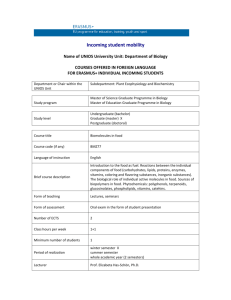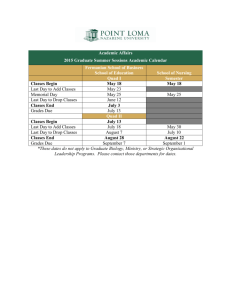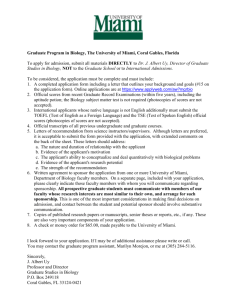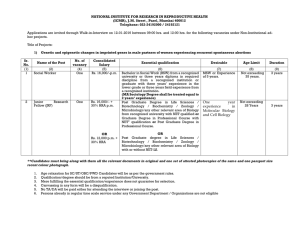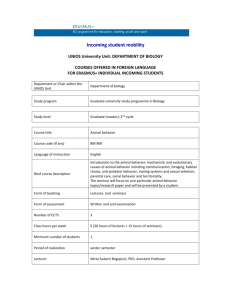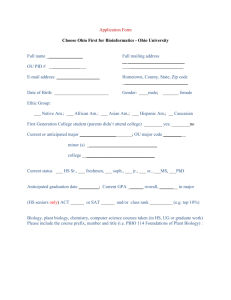Slide 1
advertisement
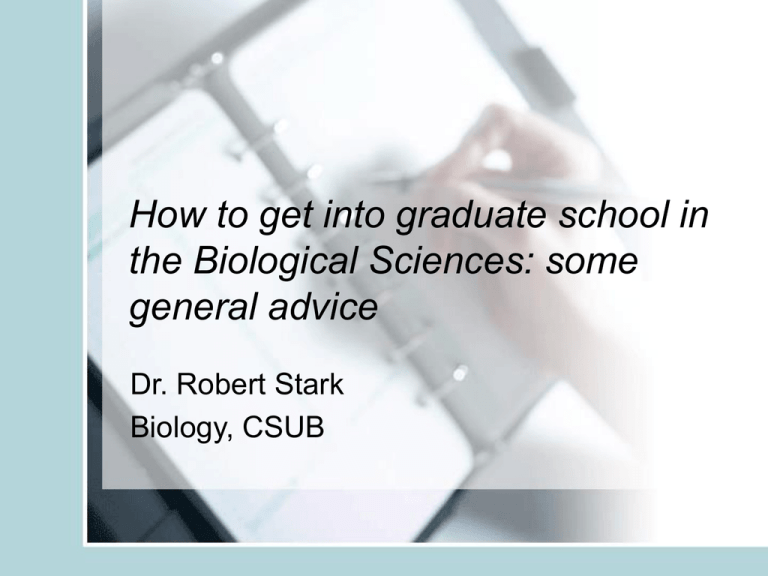
How to get into graduate school in the Biological Sciences: some general advice Dr. Robert Stark Biology, CSUB Comments concerning graduate school from current students • "To estimate how long an experiment will take, multiply approximate time it will take by 3.14 (pi) because you will be going around in circles." - JB, Purdue University "You will cry at least once in graduate school." Brenda "Grad school has been very tough, but a lot of fun! Grad school has also molded me into a scientist," Steve S. "Don't get too comfortable in graduate school. Try to get out of graduate school as soon as possible. A year in a good paying job or in a post-doc is better than a year in graduate school." Mike, Northwestern Univ. What do I look for in a graduate program? • Match interests to programs. Ask for advice. • Name recognition goes a long way. Better known schools have high competition (Princeton, USC, Michigan, Georgia). Beautiful schools and/or locations have high competition (Univ. Hawaii at Manoa) Different types of schools? • • • • Graduate schools Medical schools Dental schools Veterinary schools • Each has different entrance standards and regulations for enrollment Within schools (divisions), there are different areas and subdivisions • Not all schools have all programs • Example: University of North Carolina • The Department of Biology offers the Ph.D. degree with specializations in botany; genetics and molecular biology; cell biology, development, and physiology; morphology, systematics, and evolution; and ecology and behavior. Although the department offers M.A. and M.S. degrees, it does not encourage students who are seeking a terminal master's degree to enroll. Programs of study: What is expected of me in graduate school? • Much less structured than undergraduate • At UNC: Each student's program of study is supervised by his or her special committee and is tailored to the student's needs and aspirations. The master's degree requires 30 hours of credit. Requirements for the Ph.D. do not include a specific number of credits. Rather, a course of study appropriate to each student is designed in consultation with that student. Does graduate school have requirements? • Obviously, YES. At UNC: • 1. GRE scores less than 5 years old; should be at least 50th percentile in each general category. 2. TOEFL, required of all international students (except those from countries where English is the official language, or those who have received a degree from a US university) and cannot be over 2 years old. The Graduate School minimum acceptable score is 213 (computer-based test) or 550 (paper-based test). 3. GPA minimum of 3.0 What if I “just want a Master’s” (M.S.) • You are not “handed” anything in graduate school: your gonna have to work for it… • May be in conjunction with Ph.D. or separate • Usually 9 classes over 2 years (4-5 required; 30 semester/45 quarter units). I can do that in a year! • Nope. • Classes not offered but every other year. • Nice try. Difficult to get enough graduate level units (usually forced to take specific courses and maybe 1-2 electives) What criteria are used to select students? • • • • • • • • • • • Some general admission criteria are: grade point averages (GPA) GRE scores (General, or both General and Subject) classes that were taken reputation of the undergraduate school letters of recommendation application statements research experience published journal articles attendance to scientific meetings Work experience (especially as lab research technicians) How do I begin? • Application procedure • DEADLINES ARE NOT A SUGGESTION – Often the school recommends a time for complete applications to be received to be given full consideration. • Interview and on-campus visits Is there a trick to the application process? • • • • • YES!! WHAT DO I NEED TO APPLY? The following materials are required before an application is considered complete (please print this out and use as a handy checklist!): The UNC Graduate School (address below) must receive: ___1. Application (paper copy OR on-line submission) ___2. Non-refundable $65 application fee ___3. One (1) official (carrying seal) copy of each of your transcripts ___4. GRE scores (UNC institution code is 5816) - see below for info on subject test ___5. TOEFL score ONLY IF you are a foreign applicant who does not have an undergraduate degree from a US University or have a degree from institutions listed at http://gradschool.unc.edu/applicant_intl.html#transcripts For Graduate School information and submission of application materials: UNC Graduate School Admissions Office CB# 4010, Bynum Hall Chapel Hill, NC 27599-4010 But most don’t read on• The UNC Department of Biology (address below) must receive: • ___6. One (1) official (carrying seal) copy of each of your transcripts ___7. Department of Biology Supplemental Application ___8. Three (3) letters of recommendation • For department information and submission of application materials: Graduate Admissions CB#3280, 212 Coker Hall Chapel Hill, NC 27599-3280 Telephone: 919-962-3391 A supplemental application? • YES! • Often it includes a writing sample, research interests, contacts with faculty, courses, preparation, submission of dissertation ideas, publications, etc. What about the GRE’s? • The graduate records exam has 2 sections: • General: Math and English (verbal, writing, math) 200-800/each. Varies on major for what is a good score: Biology averages 500-600 each. ($115, 2003-2004) • Subject: In one of 8 specific fields (Biology is one). 700+ will get you in to a good, well-known program, > 500 will bar you from many programs. ($130, 2003-2004) Do I have to take them? • Depends on the program. Read each carefully. Most require general, some both. • Take late in Junior year, early Senior year. Do not go past October to have time for January applications. UNC as our example: • DO I NEED TO TAKE THE GREs? Yes. You must take the general test, and we recommend that you take the subject test in either Biology (code 24) or Biochemistry (code 22). The subject test is not absolutely required for consideration, but it strengthens an application. Please take the subject test that you feel most prepared for. We recommend taking the GREs in the Fall prior to the year for which you are applying. Many students take the general test in October and the subject test in December, but you can do this at your convenience. Remember that it takes 4-6 weeks for the official scores to be reported, so try to take them before you submit your completed materials. Doesn’t my B.S. count for anything? • Yes, depending on your coursework… • Typical classes expected: General Biology, Biochemistry, Molecular Biology, Cellular Biology, Physiology, Developmental Biology, Organic chemistry, Calculus, Physics (can be non-calculus based), Physical chemistry, Population biology, Statistics • Don’t have these? Conditional acceptance (you have a year to pass the courses set out by the admissions committee) My grades are good, is that all I need? • Not even close. Need the GPA and GRE scores. • Supplemental application asks for research interests. SPEND TIME ON THIS ESSAY. • Need OUTSTANDING letters of recommendation for the best programs. Form letters are the kiss of death to an application… • Reference or recommendation? Letters of reference are not nearly as strong. There should be NO DOUBT about what the reviewer will say. Letters of recommendation • 2-4 people, usually with advanced degrees in areas of interest and related fields (math, statistics, chemistry, ag sci., physics, etc.) • Research? From the PI you worked for. Don’t want to? Explain why. • Do not get one outside the field (boss at work, pastor, etc.) unless specified by department. What to give the professor • TIME – Faster turn around the worse the letter (and it may be included in the letter) • Information to personalize the letter – – – – – – – – – – Your full name. A list of the programs to which you are applying. Your career aspirations. The science, physics, and math course you have taken and are currently taking. Note the courses that you took under the recommender, and their dates. Your current grade point average (overall) and the grade point average for science courses. Your GRE scores, if available. A description of any research experiences you have had, and any pertinent work and volunteer experiences. A list of any honors you have received. Anything that sets you apart from other applicants Any other information that you believe would help the writer. Anything else? • Remind them when it is due (Don’t bug them) • Fill out all forms prior to giving it to them • Provide all envelopes (and stamps, though the departments often cover this, it looks good) • The expected # of letters, and where they are going. • ALWAYS waive the right to see the letter Once they have an application, what next? • Application goes to an ADMISSION COMMITTEE in the department. • This committee selects candidates for consideration by the department/faculty • Faculty selects from the qualified applicants • Letters are sent with an offer. But I’m qualified, so I deserve a spot! Thousands of deserving candidates are rejected each year: OSU 5000 applications for 4 positions. The application committee selects candidates which are then chosen by the professors and labs with available openings. How do I know where these openings are? Personal contacts! This seems impossible! How do I improve my chances? • Blind application: > 5% chance • Increase # of applications (5-10 minimum) • Meet all minimum standards. If you meet all but 1, graduate admissions stops application. Requires faculty member to override block on behalf of student… • Complete applications, including letters of recommendation. • Contact faculty of the program directly (meetings, email, or phone calls) to gauge interest Who selects me then? • Faculty advisor must take you on. No advisor? Get dumped? Out of the program. • Lab may get together and select a colleague, which may require an interview with those that work in the lab. I have an interview! Now what? • Meet with faculty and colleagues. Meet students (ask: fellowships, funding, support, assistance, location, cost, weather, food, fun, space provided, equipment, quality of area, employment chances, relationship with faculty, departmental workload, etc.) • BE SURE TO THANK PEOPLE (with short letter after you return) What was that “offer”? • You are often PAID to go to graduate school. AKA., you are expected to work for the department (likely not allowed at outside job). – Expect Poverty. Ramen is your friend… • Salary and benefits (if any) specified • GRA or GTA status. Length of appointment specified (guaranteed funding) Stipends range from $10-20K/year • Taxes take a chunk. Rent may be expensive. Heating/travel/food/clothes. This may not be enough. Is there financial aid? • Yes. Up to $200K in loans/graduate level. Grants, fellowships, and alternate funding may help supplement. Likely to go into some debt… I’m in! Now what? • Expectations (i.e., requirements) • B average (lower is instant AP. 2 terms? Out of program). • Small courses. Required interaction. Come to class VERY prepared. • Departmental seminars (Req.), Journal clubs (Req.), Research (Req.), Teaching (Likely or Req.), Public speaking (Req.), National Meetings (Req.) Thesis? Dissertation? Huh? • Thesis: Master’s (usually 1 topic, 1 publication, 1 idea). May or may not be original, often part of a larger project. • Dissertation: Doctorate (2-3 topics, minimum 2-3 publications, 2+ ideas). Originality required. Must obtain valid data and have verifiable conclusions. I’ve heard there are exams… • Yes • Master’s: Thesis defense (an oral defense of your research, done in front of a committee) • Doctorate: General Exams (ACE: Advancement to Candidacy Exam; an oral and written exam. Format determined by department and committee) Dissertation defense (oral and written defense of research done in front of department and then committee). How long does this take? • Biology: Masters takes 2-4 years (Cal Poly-SLO: 3.5, Ohio State 3.2). It is the research… • Biology: Doctoral straight from B.S. is 4-8 years (Ohio State ~6). Doctorate from M.S. is 2-6 additional, depending on research (Ohio State 5.5). NOT uncommon to find students in the 8-11 year bracket. Current crackdown. Why does this take so long? • 1) Research progress has a high variability (failed experiments, hypothesis not panning out, etc.) 2) Certain fields require a more detailed story to be submitted for publication then others. 3) Variability in agreements between student and professor as to what is required to finish the degree. 4) Length of experiments may vary depending on model organism used. Do many people finish? • Drop out rate close to 50-70% in some programs. Why? • Length of commitment (~6 yrs) • Low pay compared to peers (& rent in major cities…) • Long hours (40 hours a week? Try more like 80) • Projects that fail • Tough scientific competition • Someone else beating you to the discovery (Start over!) • Change in career interests Is there a payoff? • Check the handout for salaries and long term benefits.
